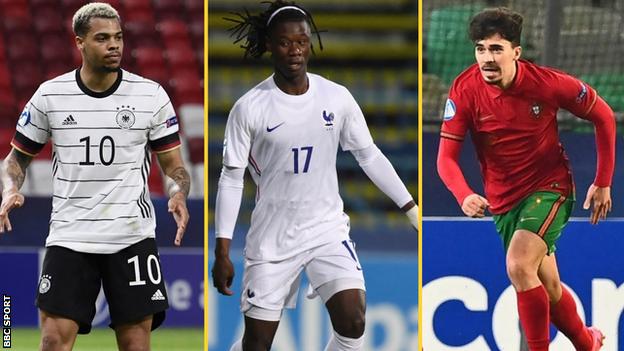

Two months after the group stage drew to a close, the Uefa European Under-21 Championship gets back under way on Monday.
England may have failed to make the quarter-finals of the competition in Hungary and Slovenia, but there will be an impressive array of talent on show when the eight remaining teams resume their bid for glory.
Unusually, the tournament is being held in two instalments this year. The group stages took place from 24-31 March, with the eight-team knockout phase running until 6 June.
The competition was initially supposed to be held in one go from 9-26 June – but it would have clashed with the rescheduled senior Euro 2020 tournament.
So, who are the favourites to lift the trophy in Ljubljana on 6 June, which players have stood out so far and what went wrong for England?
Who is left and who are the favourites?
After suffering a surprise defeat by Denmark in their opening Group C match, pre-tournament favourites France secured back-to-back victories to clinch their place in the last eight.
Sylvain Ripoll’s squad boasts several recognisable names but face a tough test against a much-fancied Netherlands side, who topped Group A on goal difference after thrashing Hungary 6-1 in their final group game.
Group A runners-up Germany may lack the star quality of previous years but are always a formidable prospect at this stage of the competition. Stefan Kuntz’s team reached the final in both of the past two tournaments, beating Spain in 2017 before losing to the same opposition two years ago.
Denmark, winners of Group C and Germany’s opponents in the last eight, are one of two teams who head into the quarter-finals with a 100% group-stage record. The Danes are looking to reach the semi-finals for the first time since 2015, when they lost to eventual winners Sweden.
Portugal, who qualified from Group D with maximum points, face Group B runners-up Italy. The Portuguese have yet to concede a goal in the competition, while Paolo Nicolato’s side have let in just one – a Giulio Maggiore own goal against Czech Republic.
Group B winners Spain, tournament holders and beaten finalists in 2017, have arguably the easiest draw. Luis de la Fuente’s team face Croatia, who scraped into the knockout stages despite losing two of their three Group D matches.
Quarter-finals: 31 May
Netherlands vs France (17:00 BST) in Budapest
Spain vs Croatia (17:00 BST) in Maribor
Portugal vs Italy (20:00 BST) in Ljubljana
Denmark vs Germany (20:00 BST) in Szekesfehervar
Semi-finals: 3 June
Spain/Croatia vs Portugal/Italy (17:00 BST) in Maribor
Netherlands/France vs Denmark/Germany (20:00 BST) in Szekesfehervar
Who are the players to watch?

Portugal forward Francisco Trincao, a Barcelona regular, was one of the standout performers of the group stage. After scoring against England and Switzerland, the 21-year-old is among a host of players on two goals so far.
Lucas Nmecha – who is on loan at Anderlecht from Premier League champions Manchester City – scored two of Germany’s four group-stage goals, with Wolfsburg winger Ridle Baku netting the other two.
Cody Gakpo (Netherlands), Patrick Cutrone (Italy), Dani Gomez (Spain), Anders Dreyer (Denmark) and Celtic striker Odsonne Edouard (France) are the other five players on two goals.
Edouard is joined in Les Bleus’ squad by Leicester City defender Wesley Fofana, Leeds United goalkeeper Illan Meslier, and 18-year-old Rennes midfielder Eduardo Camavinga – widely regarded as one of the most promising youngsters in the game.
Justin Kluivert, son of former Ajax, Barcelona and Newcastle striker Patrick, is also part of Erwin van de Looi’s Netherlands’s squad.
What happened to England?

England exited the competition in the most heartbreaking of circumstances.
After tame defeats by Switzerland and Portugal in their opening two matches, Aidy Boothroyd’s side headed into their final group game needing to beat Croatia by two clear goals.
Eberechi Eze’s penalty and Curtis Jones’ fine strike gave the Young Lions a two-goal cushion, but a stoppage-time stunner from Domagoj Bradaric ended their hopes of a quarter-final spot.
Defeat meant England, who have now failed to advance past the group stage in five of the previous six tournaments, finished bottom of Group D.







